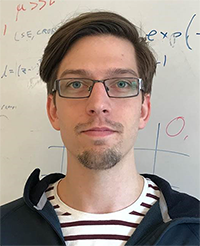 Jonatan Wårdh holds an MSc in Engineering Physics from Chalmers University of Technology in Gothenburg. He is currently in his third year of his doctoral studies at the department of physics at Gothenburg University, which closely collaborates with the physics department at Chalmers.
Jonatan Wårdh holds an MSc in Engineering Physics from Chalmers University of Technology in Gothenburg. He is currently in his third year of his doctoral studies at the department of physics at Gothenburg University, which closely collaborates with the physics department at Chalmers.
In his MAX4ESSFUN-project, he has studied the theoretical framework of pair-density wave states (PDW) in cuprate superconductors. PDW is a kind of periodically modulated superconductivity, or striped. Superconductors have an exceptional ability to conduct strong electrical currents without resistance and can for example be found in health care through magnetic resonance imaging. However, superconductivity is difficult and expensive to manage as it only emerges at a very low temperature and the material needs to be cooled down with, for instance, liquid nitrogen.
Developing theoretical framework
Cuprate superconductors show a vast degree of different orders besides superconductivity (e.g. spin and charge orders). However, how these orders develop and their relation to superconductivity is less known and more experimental data is needed. That is why Jonatan and his supervisor Mats Granath at Gothenburg University chose to look at different ways to study properties of superconductivity to better understand how it works and tried to set up a model for research in this field.
“Hopefully we will be able to design more manageable superconductors in the future – so called high temperature superconductors. The overarching goal is to find superconductors that emerge in room temperature”, Jonatan explains.
Previous theories on pair-density wave states have been assumptive and researchers have seen evidence for their existence and some of their properties, but do not know exactly how they develop. What is missing is basic theory and experimental data that can tell us to what extent these states exist.
“We have come a long way through our work regarding how we can increase our understanding of these materials and their properties, but there is still a lot left to do.”
Cross-border exchange
Jonatan explains that the knowledge required for his research project at Gothenburg University was rather restricted, and the MAX4ESSFUN-project provided a great bench marking opportunity.
“We felt rather alone in this research at Gothenburg University, my supervisor and I. To get in contact with our Danish colleagues was very informative and strengthened our work!”
Through his co-supervisor, Brian Møller Andersen and his research team at the Niels Bohr Institute at the University of Copenhagen, Jonatan could draw on the Danish expertise in this research field and gain new insights. Jonatan travelled to Copenhagen in June and in December and the Danish co-supervisor was thereafter involved in the project via continuous e-mail contact. During his time in Denmark Jonatan had the opportunity to discuss his work with Brian and learn from several other researchers at the university as well. The collaboration with the University of Copenhagen has been proven to be quite fruitful and Jonatan thinks that it will continue in the future.
“Cooperation is important for research progress and given the tough competition in the research community, collaboration in Scandinavia is essential”, Jonatan points out.
Future plans in Scandinavia
Jonatan mainly works as a theorist and has therefore not been working on experiments through the MAX4ESSFUN-project. He notes that this is an exciting area of research and could imagine working with experimental research in the future.
“The establishment of the ESS and MAX IV in Sweden strengthens the whole of Scandinavia as a centre for this type of research projects. I would very much like to live in Scandinavia in the future and therefore it is especially great that these research facilities enable such research here as well! “
Short facts:
Young researcher: Jonatan Wårdh
Experiment: Effects of a Supercurrent on the Magnetic Spectrum in Cuprate Superconductors with Co-Existing Magnetism.
Experiment period: 2017-08-01 – 2018-01-31
Supervisor: Mats Granath, Chalmers University of Technology
Co-supervisor: Brian Møller Andersen, University of Copenhagen